Real reason Australian Open will get 40K rapid antigen tests, despite huge national shortage
As Aussies struggle to get their hands on rapid antigen tests, the Australian Open will be given thousands of them, it has been revealed.
Coronavirus
Don't miss out on the headlines from Coronavirus. Followed categories will be added to My News.
As Aussies struggle to get their hands on rapid antigen tests, the Australian Open will use thousands to test staff and players to test them daily for Covid, it has been revealed.
The Australian reports that RATs will be used to clear players and staff of coronavirus, despite the public’s struggle to get their hands on the tests due to widespread shortages.
Tennis Australia requires its 3000 staff members, players and their entourages, and media to test negative every single day of the 14-day tournament, meaning the Open will require about 40,000 rapid tests.
It came after it was announced that crowds at the Australian Open would be capped at half-capacity due to the Omicron crisis, though tickets and ground passes already purchased will not be cancelled.
NSW HAS 63,018 CASES, 29 DEATHS
NSW has reported 63,018 new Covid-19 cases on Friday including 37,938 rapid antigen test results.
A record 29 deaths of people with Covid-19 have been confirmed in the latest reporting period, making Friday the deadliest day of the pandemic in NSW so far.
There are 2525 people in hospital with the virus, with 184 of those in intensive care, up from 2383 and 182 respectively on Wednesday.
Of the new cases, NSW Health said 37,938 were detected on rapid antigen tests (RATs), with 24,329 of these positive tests from the previous seven days.
There were 25,080 positive cases from PCR tests.
It comes after Covid-19 cases surged on Thursday with 82,000 rapid tests from the last 12 days included in the tally.
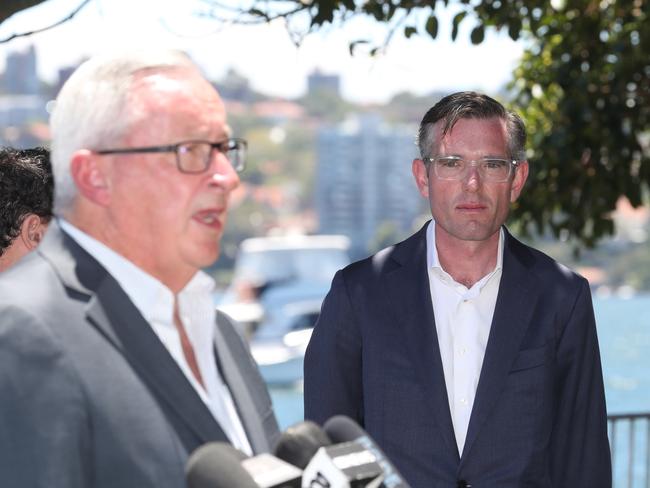
The state government has made it mandatory for residents to report their rapid tests or face a $1000 fine, which will come into force from next week.
Almost 14,000 people reported their results through the Service NSW app within two hours of the online portal being launched at 9am on Wednesday.
NSW Health authorities have blasted Hillsong megachurch after a youth summer camp underway in Newcastle was found breaching strict public health orders, with hundreds of young people singing and dancing massless despite a statewide ban.
The state outlawed dancing and singing at nightclubs, pubs, bars and entertainment facilities amid a spike in Covid-19 infections across the state, but churches were allowed to go ahead with large religious gatherings.
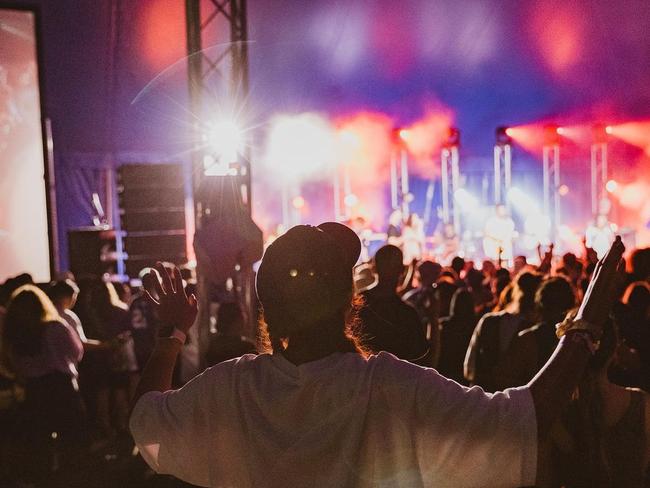
Footage emerged from Hillsong’s youth “Wildlife Summercamp 2022” on Thursday, which showed young people in a large crowd singing and dancing, with some shirtless or on each other’s shoulders while top-40 music plays loudly.
Hillsong has defended itself, saying the event was following “strict Covid procedures and adhering to government guidelines”.
Health Minister Brad Hazzard released a statement on Thursday saying Hillsong had been told to “immediately stop singing and dancing” at the youth camp event.
“While the (Public Health) Order does not apply to religious services, it does apply to major recreation facilities, and this event is clearly in breach of both the spirit and intent of the Order, which is in place to keep the community safe,” Mr Hazzard said.
VICTORIA HAS 34,836 CASES, 18 DEATHS
Victoria recorded 34,836 new cases and 18 Covid deaths in the past 24 hours.
There are now 976 infected people in Victorian hospitals, with 112 in intensive care and 30 on ventilators.
Victoria’s pre-Omicron peak for Covid hospitalisations was 851 in October when the state was battling a surge in Delta infections.
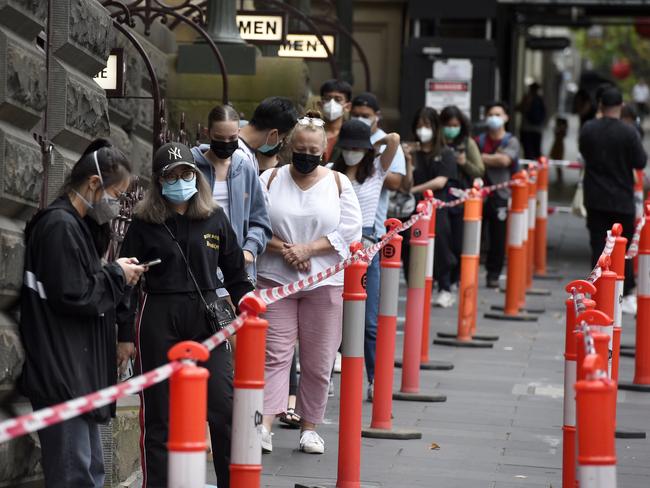
However, the figure is dwarfed by the 2383 people in NSW who are in hospital with Covid.
More than 93 per cent of eligible Victorians are fully vaccinated and the state has a mammoth 239,396 active cases.
A total of 62,445 PCR tests were taken on Wednesday and 24,071 vaccines were administered at state hubs.
QLD HAS 23,630 WITH 3 DEATHS
Another three people have died as Queensland reports a record 23,630 new Covid infections ahead of the removal of domestic border restrictions.
Chief health officer Dr John Gerrard said Friday’s deaths included two unvaccinated people in their 70s and one unvaccinated person in their 60s, bringing the toll since the start of the pandemic to 20.
Queensland’s daily virus caseload jumped by more than 50 per cent on the 14,900 infections reported yesterday, clearing the previous high of 22,000 cases on Wednesday.
Of the new Covid caes, 10,182 were positive rapid antigen tests recorded online, a figure that has more than tripled in the space of a day.
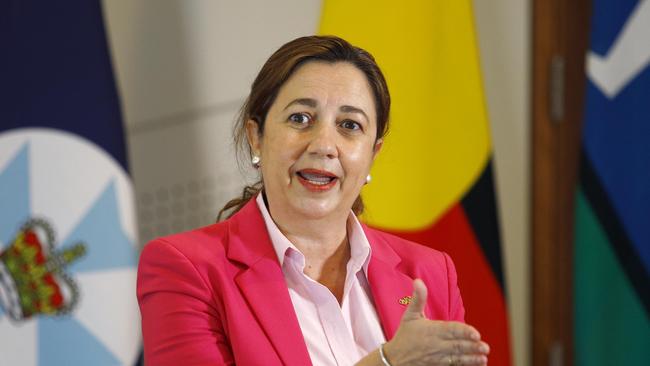
There are 589 Covid patients in hospital in Queensland – up from 530 over the past 24 hours – with the number of intensive care patients jumping from 26 to 41.
There are 15 people on ventilators, up from 10.
Dr Gerrard said South Brisbane was the current area of concern in terms of cases and hospitalisations.
“That’s where most of the growth is occurring at the moment,” he said.
He did however point out that the growth in hospitalisations was ‘steady’ as opposed to an ‘explosion’ of case.
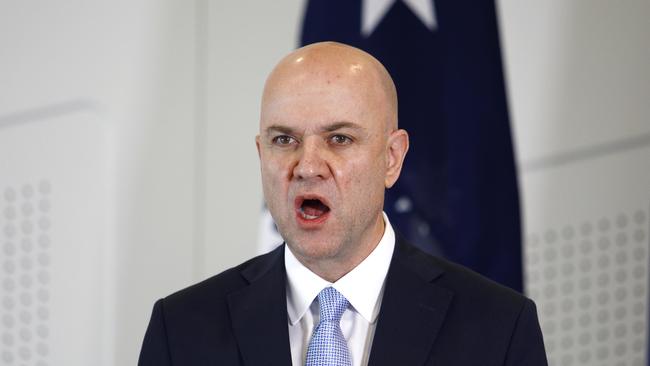
More than 165,000 Queenslanders currently have the virus, a figure that is expected to surge over the next two weeks as the Omicron wave moves towards a peak.
Dr Gerrard tipped Gold Coast as the most likely region to see a peak in the Omicron wave.
Friday’s update comes after the state recorded its deadliest day of the pandemic so far, with six people dying from the virus on Thursday.
All were aged in their 70s to 90s with significant underlying health conditions and had varying vaccination statuses.
Meanwhile, the Sunshine State is preparing to end two years of uncertainty by removing all restrictions on domestic travellers, meaning border applications and negative rapid antigen tests are longer needed to enter Queensland from hotspot areas.
The new rules come into effect from 1am on Saturday, with Dr Gerrard saying the state’s strict border regime had served its purpose.
With double vaccination levels fast approaching 90 per cent, tourism bosses now have their sights firmly set on international arrivals.
FOUR Covid DEATHS RECORDED IN SA
Thousands of asymptomatic close contacts are now allowed to return to work in South Australia, as the state recorded four new Covid-19 deaths.
Premier Steven Marshall said there were 3669 new cases on Thursday, with two men aged in their 80s and two women aged in their 70s dying with the virus.
The number of people in hospital also increased to 225. There are 26 people in intensive care, with seven on ventilators.
Thursday’s numbers are down on Wednesday when seven deaths and 3715 new cases were recorded.
The close contacts are allowed to return to work under new directions from police.
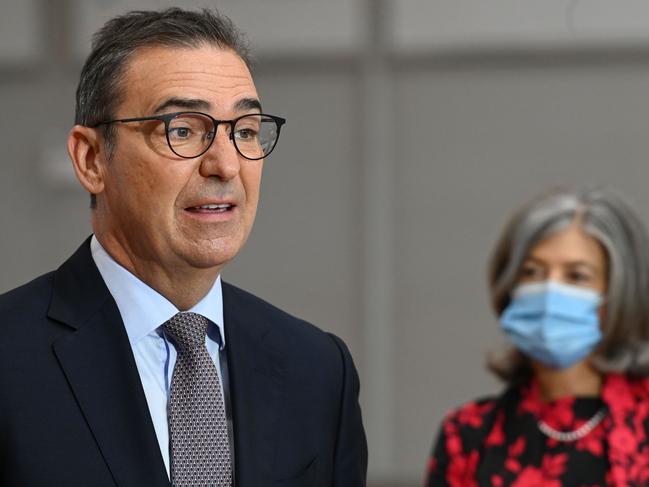
The new rules affect 14 industries and anyone who is a close contact of a positive Covid-19 case will be able to go back to work to “maintain a function critical to the South Australian community”.
The critical close contact must be separated from the positive Covid-19 case while not at work, be fully vaccinated with a booster shot if eligible and have undertaken a PCR test before coming to work.
If awaiting a PCR test result, they are still permitted to return to work so long as they have returned a negative rapid antigen test.
From Thursday, close contacts can also register on the SA Health website and pick up two free rapid antigen tests from the supersite at Southern Parklands.
It will only be mandatory to report a positive result, and if they receive one, they will not be required to get a PCR test.
“We see and envisage that there’ll be a large number of people switching from PCR testing to rapid antigen testing,” Mr Marshall said on Wednesday.
“I would just point out that the PCR testing is still far more accurate.
“It’s still the preferred test, but we do want to provide this alternative pathway as well.”
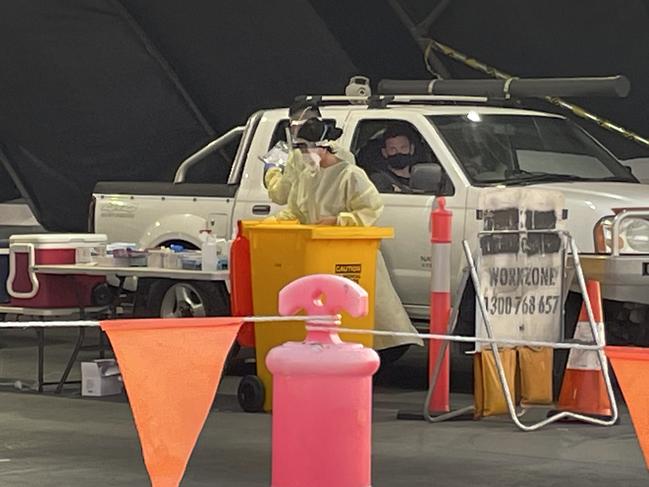
Mr Marshall reported a “near record” of vaccinations on Wednesday, with 21,581 people getting the jab.
A schools plan will be unveiled in full on Friday, with schools to open January 31 for children of essential workers and vulnerable children.
Classes will resume on February 2, with classes split between online learning for the first two weeks for some students and face-to-face learning for reception, years one, seven, eight and 12s.
“We know this will massively reduce the number of new infections during February,” Mr Marshall said.
“We had a good update from the modellers today. We’ll get another final update tomorrow before that’s more fully released to the general public.”
Further advice about rapid antigen testing in the school environment will be released next week, he said.
Meanwhile, WA recorded two new local cases and 14 travel-related infections overnight.
One of the new cases is linked to the Hyatt Hotel cluster and the other is a household contact of previous infection related to interstate travel. Both are in quarantine.
GP FURY ON KIDS’ JAB SUPPLY
Millions of children aged 5-11 are eligible to get their Covid-19 vaccination from Monday, as Australia expands its fight against the virus.
There are reports some general practices have cancelled appointments on Monday because of supply shortages.
But Health Minister Greg Hunt insists there is enough supply to vaccinate every child.
“I want to encourage all parents to bring their children forward over the period between now and the end of January, to protect them and to help protect the community with the vaccinations,” he said on Sunday.
“The important thing is that we have a population of approximately 2.3 million children in the eligible five to 11 age group, but with three million doses available over January, and two million doses available over the course of the next two weeks.”
The rollout comes as concerns have been raised about supply levels.
Royal Australian College of GPs Victoria chairwoman Anita Munoz said practices in Melbourne had reported receiving only 100 doses of the Pfizer vaccine each week.
“The supply has been unpredictable,” she said.
“The most important thing is the number of doses delivered … is insufficient. (100 doses a week) is woefully inadequate when you consider GPs have about an average of 1500 kids on their books for a whole practice.”
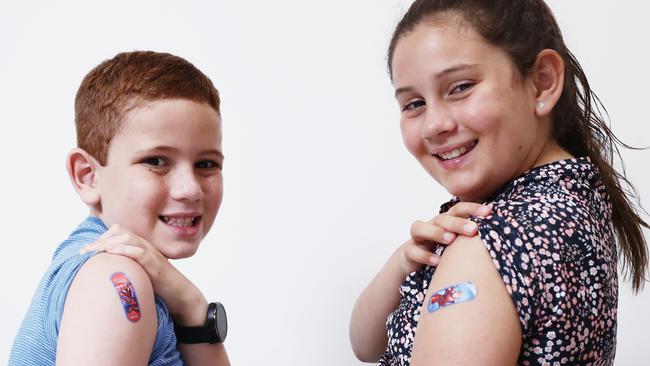
As the return to school escalates, Queensland has announced term one would start two weeks later amid a projected Omicron peak.
Premier Annastacia Palaszczuk said she wanted to see as many children as possible vaccinated before returning to the classroom.
“I know parents are concerned about sending children back to school at a time like this, so I want to assure them that delaying the start of the school year by just two weeks is a sensible solution,” Ms Palaszczuk said on Sunday.
“This is especially important to give more time to vaccinate 5-11 year olds, who only become eligible to be vaccinated (from) Monday.”
Mr Hunt said there would be multiple options for children to get their vaccination – through GPs, Commonwealth vaccination clinics, state hubs, pharmacies or Indigenous medical clinics.
AUSSIES TOLD TO STOCK UP ON PAINKILLERS
Australians have been warned many of us will likely test positive to Covid in “coming days” and are being urged to be prepared by having paracetamol before becoming infected.
It comes as the country reached a major vaccine milestone with more than 44 million doses administered.
Health Minister Greg Hunt said it was “heartening” to see Omicron was milder than previous strains of the disease, pointing to only 76 people who were on ventilation across the country.
Despite a significant increase in new cases Mr Hunt said the strain was “significantly less severe”.
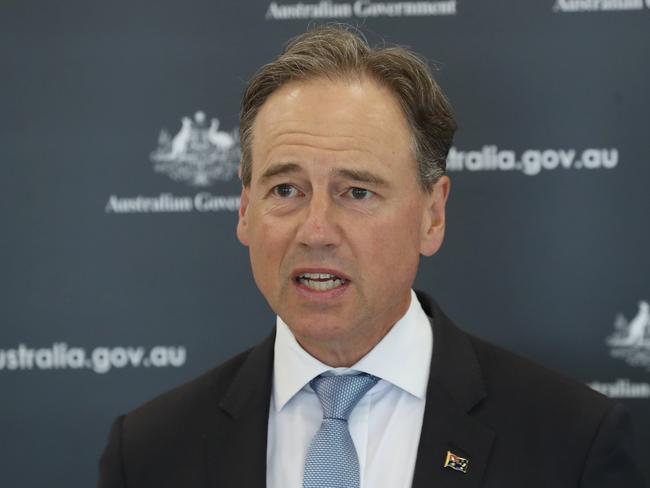
Deputy chief medical officer Michael Kidd said it was likely many Australians would test positive in the coming days and weeks as case numbers continued to surge.
“With the rising case numbers we’ve seen over the past week in many parts of the country, it’s likely that many of us will test positive for Covid-19 over the coming days and weeks if we haven’t already done so,” he said.
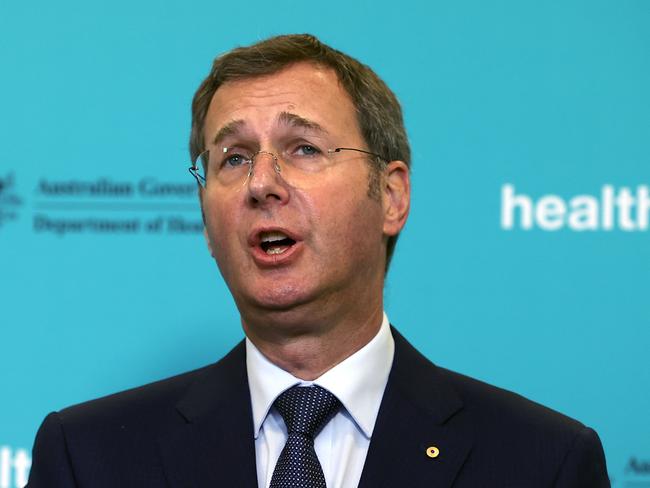
He urged people to be prepared for any potential infections by having paracetamol or ibuprofen at hand to manage fevers and mild aches or pains.
“The first thing to do is to be prepared,” he said.
“My advice is that you make sure you have some paracetamol or ibuprofen at home in case you’re diagnosed with Covid-19.
“Paracetamol or ibuprofen can be used to manage fever and aches and pains.
“It’s important to be prepared because you won’t be able to go to your supermarket or pharmacy if you are diagnosed with Covid-19.”
Professor Kidd said many people would have no symptoms at all, while others would have mild symptoms.
– Blake Antrobus, Amanda Sheppeard, Ellen Ransley, Catie McLeod, Zoe Smith
More Coverage
Originally published as Real reason Australian Open will get 40K rapid antigen tests, despite huge national shortage




